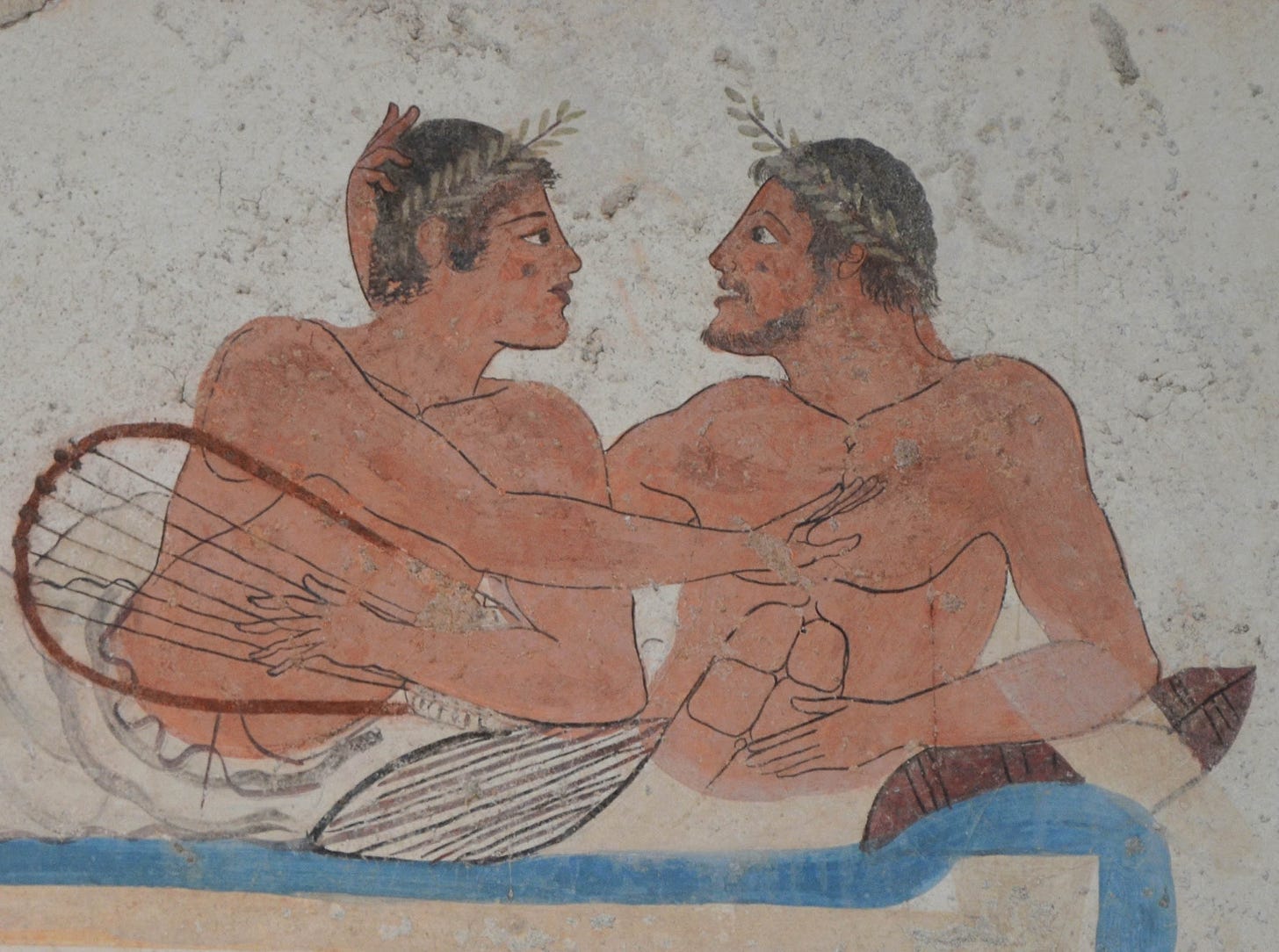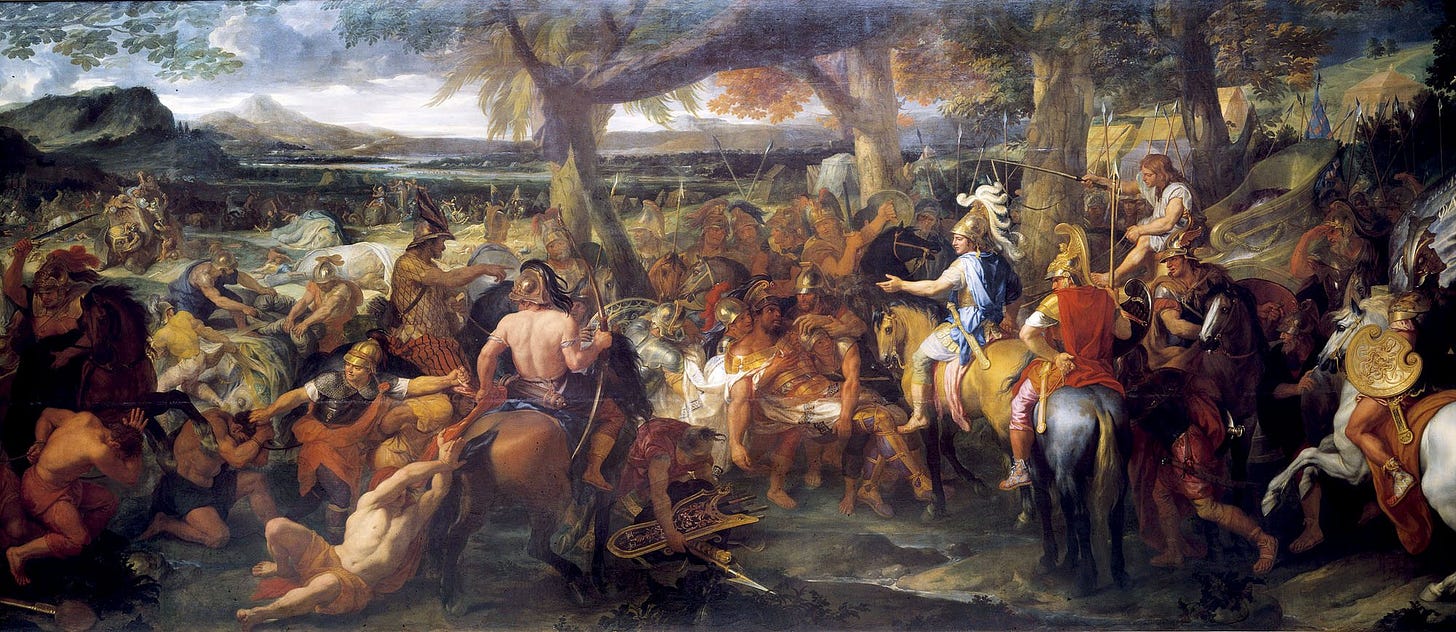Alexander the Great: Pansexual Icon
And when Alexander saw the breadth of his domain, he wept, for there were no more genders left to conquer.
Sorry for the sudden and inexplicable gap in newsletters everyone, did you know that sometimes when you have ADHD you can actually have so many ideas that you end up completely paralyzed and don’t actually make any progress on any of them? It’s true!
Anyway, this one should be fun. I learned at pretty much the same time yesterday morning that Netflix has made a documentary on Alexander the Great and that they’ve made it woke.
I have not seen Alexander: the Making of a God and I probably won’t because I went through an intense Alexander phase when I was about fifteen years old and have absorbed every publicly available fact about the life of Alexander III of Macedon (plus I already watched the 2004 Alexander movie starring Colin Farrell and I am still recovering). Still, this particular reaction from the anti-woke crew is very, very funny to me, and while debunking an account called “End Wokeness” is a bit like shooting fish in a barrel, sometimes it’s nice to have an easy win.
As of the writing of this newsletter, the “End Wokeness” post about Alexander has about 60k likes. Almost every reply is telling the guy he’s wrong, even people on his side, but that’s never stopped a bigot before and I doubt it will stop this one either. While I think discussing the sexuality of historical figures, done respectfully, can be an entertaining and enlightening exercise, I try to avoid it, largely because it is more or less impossible to map modern ideas regarding sexuality onto anyone born before 1950. Still, there are a couple of reasons why getting mad about Alexander being depicted as gay are especially funny.
The first reason is the very obvious truth that the Greeks did not view sexuality in the same way that modern westerners do. I don’t have space here to go into great detail, but let’s just say that sexual relationships between men and younger men (and less so adult men) were extremely commonplace and not only accepted, but celebrated (see: all of Plato’s Symposium). While not all homosexual relationships in Greece were pederasty, this was a common and normalized relationship form (historians disagree about how consensual and or voluntary these relationships were).

As I have alluded to, ideas like “homosexuality” did not exist in Ancient Greece and it is not really possible to map modern sexual mores onto non-modern societies, but one thing that we can definitely say is that if you are looking to Ancient Greece for a model of manly, heterosexual virtue, you are very much barking up the wrong tree.
Which brings us to Alexander himself. In his early life he was actually known for being abstemious when it came to matters of sex, exercising self-control around women for which he was praised by contemporaries (and future fun-hating Romans). He did get married, first to a woman named Roxana, then to others named Stateira and Parysatis, about which we know relatively little. He fathered at least one son with Roxana, and there is a great deal of speculation about other possible children with a whole host of potential mothers.
The relationship of his that we know the most about, however, is the relationship he had with Hephaestion, one of his commanders and a close childhood friend. Hephaestion first appears in history when Alexander arrives at Troy and pays a special visit to the tomb of Achilles and Patroclus.
Furthermore, the gravestone of Achilles he anointed with oil, ran a race by it with his companions, naked, as is the custom, and then crowned it with garlands, pronouncing the hero happy in having, while he lived, a faithful friend, and after death, a great herald of his fame. (Plutarch, Life of Alexander)
Arrian tells us that Alexander laid a wreath at the tomb of Achilles, and that Hephaestion laid one in the same manner at the tomb of Patroclus. Once again, without going into too much detail, it is believed by many scholars that Achilles and Patroclus were lovers, and many Greeks also believed this to be so, and honored them as such.
Other sources record that when Hephaestion died on campaign that Alexander did not eat for days and threw himself onto the body and had to be dragged away by his soldiers. While this is not exactly hard evidence that Alexander and Hephaestion were lovers, it does seem to suggest something very strongly (draw your own conclusions I guess).
Ancient sources also record that Alexander had a relationship with the eunuch Bagoas, though there is, again, some disagreement on the nature of that relationship. At least a couple of different accounts tell of Alexander kissing Bagoas publicly, to great celebration by his men. In fact, one ancient source, On the Sacrifice at Ilium, by Dicaearchus of Messana, discusses both of these events, though only fragments of it remain. The title and fragmentary text suggests that it might be a treatise on Alexander’s love life or love in general — the Roman-era writer, Athenaeus, drew the conclusion from this work that Alexander was “excessively keen on boys”.
So, while there is no concrete primary source evidence that Alexander had sexual relations with other men, there is strong circumstantial evidence that he was indiscriminate in his attentions. Contemporary sources and later ancient writers all agree that Alexander enjoyed the company of women, men, femboys, and everything in between. A true pansexual icon.






